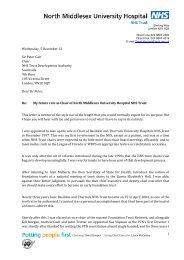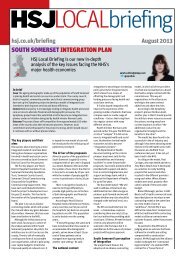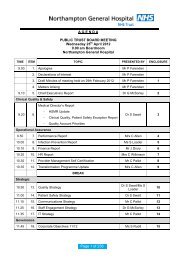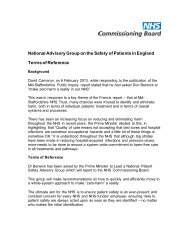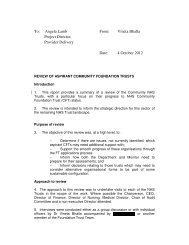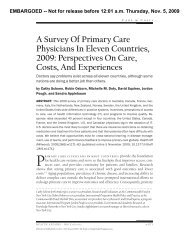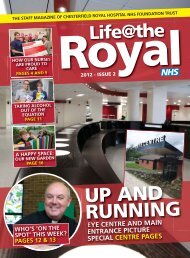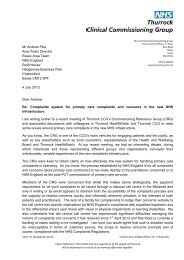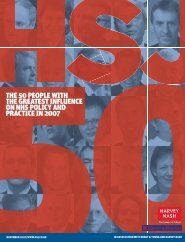Top leaders supplement - Health Service Journal
Top leaders supplement - Health Service Journal
Top leaders supplement - Health Service Journal
Create successful ePaper yourself
Turn your PDF publications into a flip-book with our unique Google optimized e-Paper software.
FOREWORD<br />
SIR DAVID NICHOLSON<br />
Seek and employ<br />
Recruiting to top jobs in the NHS has historically been a hit and miss affair, but all that<br />
is changing with a new, evidence-based approach to identifying talent<br />
We all know that <strong>leaders</strong>hip is<br />
important. It has long struck me<br />
that what has been missing in<br />
the NHS is a real focus on<br />
<strong>leaders</strong>hip across the system.<br />
Leadership shouldn’t happen by<br />
accident. A system as large and<br />
complex as ours needs to be<br />
much more systematic about<br />
how we identify talent and<br />
develop <strong>leaders</strong>hip.<br />
The next stage review helped<br />
to make clear why the NHS is<br />
here – to improve the care<br />
provided for our patients and the<br />
health of our population by<br />
making quality our organising<br />
principle. Keeping true to this<br />
vision is crucial. The appalling<br />
failures at Mid Staffordshire<br />
illustrate how badly wrong<br />
things can go when the focus on<br />
quality is lost and <strong>leaders</strong>hip<br />
fails at every level from ward to<br />
board.<br />
The National Leadership<br />
Council was created to support<br />
the NHS in strengthening<br />
<strong>leaders</strong>hip at all levels. It has five<br />
big areas of work that cover<br />
clinical <strong>leaders</strong>hip, board<br />
<strong>leaders</strong>hip, inclusion, emerging<br />
<strong>leaders</strong> and top <strong>leaders</strong>. This<br />
<strong>supplement</strong> focuses on the last<br />
of these.<br />
As I said in my annual report<br />
2008/09, the NHS is going to<br />
need to deliver £15bn-£20bn in<br />
efficiency savings by the end of<br />
2013/14 that can be reinvested<br />
within the service so it can<br />
continue to deliver quality<br />
improvements.<br />
The challenge of making<br />
quality our organising principle<br />
while managing with less<br />
growth in the future is massive.<br />
We must not deliver efficiency<br />
improvements at the expense of<br />
quality – and we cannot deliver<br />
quality simply by throwing<br />
money at it. We need talented<br />
<strong>leaders</strong>, in our most demanding<br />
roles, who can improve quality<br />
and efficiency by focusing on the<br />
needs of their patients, inspiring<br />
their staff, working in partnership<br />
and living the values articulated<br />
in the NHS constitution.<br />
It is tough but it is possible.<br />
We need a relentless focus on<br />
improving quality and<br />
productivity, using innovation<br />
and prevention to drive and<br />
connect them. We need to use<br />
the final year of significant<br />
growth in 2010/11, averaging 5.5<br />
per cent. It is critical that local<br />
clinicians and managers work<br />
together across boundaries to<br />
spot opportunities and manage<br />
the change. And we need to act<br />
now and for the long term. That<br />
means significantly changing<br />
the way we operate.<br />
The evidence shows that the<br />
big efficiency gains are to be<br />
found in the interfaces between<br />
sectors, between primary and<br />
secondary care, between health<br />
and social care, and between<br />
empowered patients and the<br />
service.<br />
The important point about<br />
<strong>leaders</strong>hip in all of this is that we<br />
need to focus on the pathways of<br />
our patients and what value we<br />
can add to that journey. How can<br />
we shorten it, make it more<br />
effective and give patients a<br />
better experience. It means<br />
thinking outside our own<br />
organisational and professional<br />
interests so that quality is our<br />
organising principle.<br />
Success requires bold and<br />
thoughtful <strong>leaders</strong>hip,<br />
re-thinking how we work and<br />
challenging current practice.<br />
The skill, professionalism<br />
and <strong>leaders</strong>hip shown by the<br />
NHS <strong>leaders</strong>hip community<br />
over the past few years has<br />
been key to delivering<br />
We are going<br />
to depend<br />
more on<br />
strong<br />
<strong>leaders</strong>hip<br />
than we have<br />
in the past<br />
major improvements. But we are<br />
at a critical juncture in the<br />
history of the NHS and are<br />
going to depend more on strong<br />
<strong>leaders</strong>hip over the next few<br />
years than we have in the past.<br />
A key question, then, is how<br />
we bring really talented people<br />
forward. In the past, it has been<br />
left largely to chief executives<br />
exercising their judgement and<br />
it’s been a bit hit and miss.<br />
That’s why we have gone<br />
through the talent and<br />
<strong>leaders</strong>hip planning process.<br />
I recognise this is a difficult<br />
thing for us to do in the NHS. In<br />
the past, there’s been a view that<br />
everyone should have<br />
everything. The point about<br />
being a chief executive is to<br />
make judgements about who is<br />
going to do well, who has the<br />
potential and who hasn’t. What<br />
this new approach is saying is<br />
that those judgements need to<br />
be evidence based and made<br />
within a systematic process.<br />
Our top <strong>leaders</strong> have an<br />
important role to play in<br />
leading whole-system<br />
change. It’s a massive<br />
challenge. We need our<br />
most talented people and<br />
we need a systematic<br />
process in place to<br />
identify and support<br />
them to give us our best<br />
chance of success. ●<br />
Sir David Nicholson<br />
is chief executive<br />
of the NHS.<br />
hsj.co.uk<br />
4 March 2010 <strong>Health</strong> <strong>Service</strong> <strong>Journal</strong> <strong>supplement</strong> 1



